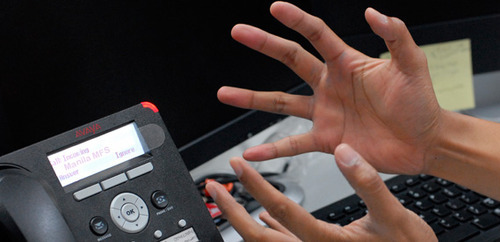
By Leonel Guzman
Ring, Ring… “Oh no, it’s Manila MFS – they’re at it again!”
Well, pick up then! You should. Always. And here’s why.
Here’s the Thing: There are two sides to our global work: operations and reporting. The latter (in this specific case, financial reporting), which has less visibility, is why we’re here in the first place. So why do we ask you – among various other questions – for updates on receivables (monies owed to IOM), or information about a project that, even if ended in 2008, still has money in its accounts? Two main reasons. One, because it’s part of the governance of the Organization, and two, because the External Audit (let alone donors and Member States) vigilantly check on the way we use the money. Keep in mind that our overall credibility depends on both sides our performance in operations, and how we, IOM, manage the money (with not so much overall visibility)!
We (IOM) need clear, concise, objective, and documented answers – all these four characteristics. If in one given month we receive a shallow answer like “.. we are negotiating with the donor,” we have to ask again because IOM needs to know (governability), and because the External Audit, that is evaluating our performance in the finance field, will ask “And did you ask again?” or “What is the latest answer?”.
Our justification for deficits, large amounts owed to IOM, monies sitting on projects even if the projects finished 3 years ago required, etc. must be robust and documented justifications. Vague responses are not enough (it may be for internal purposes). But the Auditors will ask, will want to see email exchanges, will ask, and will ask again. DOCUMENTED (yes, in capitals) is a key word here.
As the world (and the donors) moves into scarce resources and more scrutiny, we need to build our credibility on our financial management.
Imagine a donor subcontracting the services of an NGO that takes years to collect monies, gives millions in advances to vendors, and in the last three years loses over 1 million dollars. On top of that, when asked about what happened, the response simply is “Well, we tried to manage..” Ugh. Uncomfortable? IOM can’t be that.
So here’s the thing: Provide OBJECTIVE, ROBUST, and DOCUMENTED answers to financial questions. That’s what we have to pass on to the people evaluating our institutional performance.
The IOM Project Handbook is a useful tool that includes standard procedures for preparing well-documented financial reports. You will find details on Reporting in Module 5 and can access the Financial Donor Reporting Checklist (among other useful templates). The Handbook is available on the IOM Bookstore (LINK TO http://publications.iom.int/bookstore/index.php?main_page=product_info&cPath=47&products_id=751).